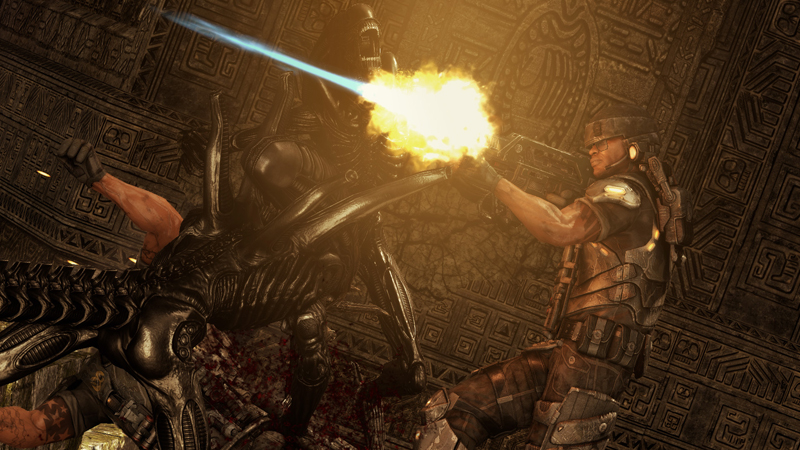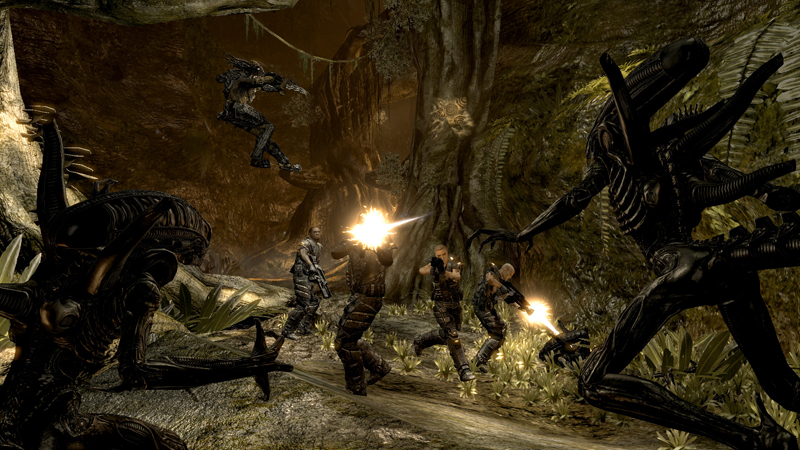he Alien debuted as a phantom horror in 1979, the Predator in 1987. Aliens vs. Predator premiered as a Dark Horse graphic novel in 1990. Derivations of conflicts between Aliens, Predators and colonial marines have littered cinema, publishing, and video gaming since, the last films having been kept from dubious critics until release. Dan O'Bannon and Ridley Scott's masterpiece thriller — implanting HR Giger's otherworldly spectacles within a mundane, bulk-freight future — nears collapse as a concept after three decades of persistent excavation; the dreadful, spiritless slog that is Rebellion Developments' and Sega's production of the Twentieth Century Fox franchise only one more tremble.
Three single-player campaigns, one for each faction, serve tripartite mayhem. The marine campaign leads, its story the most traditional, familiar, and — thus — spent. We must have at least sensed over the years how the dramatic arc hardly varies. Admit it: you buy a ticket to watch mankind dabble with one or more xenomorphs that go berserk and eliminate all but a handful of the cast, causing unsolicited bodily perforations along the way. Ridley Scott likened the entertainment of the hunt to Agatha Christie's Ten Little Indians, but repeated in sequence ten times over, it has degenerated into as base a conditioned stimulus-response as pornography.

Don't get attached: marines face every clichéd demise within forty-five seconds.So it comes to some baffling shock when Rebellion chooses the same formula — and then skips past the suspenseful buildup in which lock-and-load hubris meets an abandoned industrial site with curious acid burns on the walls and floors. After an inchoate cutscene, the "Rookie" player character, left behind by his squad with all the logical motivation of the original Doom, sets off under the guidance of one of a few surviving marines.
About ninety minutes in, a mystery begins to unfold and propel the Rookie and two abettors toward a plausible, if predictably ironic, conclusion. Before that, players must endure play and dialog that should have been dispersed as filler but instead introduce the game. Orders take the Rookie to one overrun corporate compound after another, where prescriptive, triggered encounters and vexing escape runs await. Marines at each checkpoint face every clichéd demise imaginable, not one of them surviving longer than forty-five seconds after the Rookie has met them or heard them over the radio — first named, then, as the developers must have caught on, anonymous. Insofar as Aliens' victims — Kane, Lambert, Dallas; Drake, Apone, Hudson — moved an audience given a chance to connect to them, these deaths simply occupy play time.
Not coincidentally, the limited fun of combat begins with the right kind of gunplay. The handheld pulse rifle's sing-song chatter should transport movie fans back to the surly machinery and industrial stencils of Scott's and James Cameron's efforts, but the "smart gun" — the low-slung, light machine-gun handled with deadly grace by Jeanette Goldstein's PFC Vasquez — is without equal Aliens vs. Predator's most enjoyable weapon, and fun in and of itself.

What's wrong with fun? The game's most enjoyable gun can be used only twice.That the Rookie can wield it only twice over a few hours begs whether Rebellion understands the franchise. Yes, most games initially arm a player feebly, a peashooter replaced by more powerful hardware. But the excitement of Aliens comes from the reverse: well-armed and fully equipped detachments are overpowered; pursued; and stripped, through casualties and dwindling supplies, to mere strength of character. A smart gun should have been in the Rookie's hands first.
These considerations are interrupted by the second and third single-player campaigns. A fair interpretation of "Aliens vs. Predator" allows players to control the Aliens and Predators, but really, there is little tension or relation to be had unless one is a remorseless trophy-hunter or instinctive killing machine. Both campaigns seem obligatory.
The xenomorphs, as seen in the marine campaign, are cunning and mercurial — swiftly moving in and out of darkness, pinging the motion sensor here and there, striking when the time is right. Better left to AI, the Alien campaign being a disorienting, stomach-turning mess. Facile objectives, complicated only by obtuse level design, turn into "find the waypoint" as a player struggles with the cumbersome plane-vaulting mechanic. And feral acumen doesn't negate loathsomeness — other than manipulating electronics to brute ends, gameplay consists of serial butchery accented by wet crunches.
Predators follow a terse warrior's code, differentiating them from the Aliens as far as intent; and the tools available to a "youngblood" hunter such as a cloaking device, beam weapon, and ability to leap make for unique play. But the campaign seems extraneous, despite this race's sacred grounds having been trespassed upon. The player character, too, ends up swiping and bashing and dismembering and mostly terrorizing unlucky conscripts.

The Alien and Predator campaigns offer little unless one is a remorseless trophy-hunter or instinctive killing machine.Here, too, Rebellion misses the point: one-by-one murders grip audiences because survivors react to the disappearances and deaths. ("Wierzbowski . . . ? Wierzbowski!") But AI marines appear to have no relation other than proximity, reacting only to the Alien or Predator and not each other — and most troublingly, faultily reverting to alert modes while under attack or speaking after having already been filleted.
There is multiplayer: I tried it and did well, otherwise finding it quotidian and not exactly redemptive. Reportedly, players find it a lot of fun. Best wishes to them. They paid sixty dollars for Team Deathmatch.
In November, I mused over whether Valve Corporation might dress up the foundation of the Left 4 Dead series for another series. Aliens vs. Predator cements my conviction: traditional first-person shooters have reached obsolescence, particularly for the horror genre. Very little in this game justifies static enemy placement and predictable events, at the same time that the most essential qualities of the Aliens series demand that the Rookie not be alone. Up to four players — colonial marines, unlucky spacers, even a corporate hack — could battle dynamic waves of Aliens and whatever else, brave the perils of a half-terraformed planet, and maybe escape with their lives. Imagine. Twentieth Century Fox picked the wrong licensees.
Not a clone but similar, acknowledging the new standard Valve set. Likewise, I'd argue this game is indistinguishable from any mediocre first-person shooter made over the last ten years.
Valve has the best answer to mass-target horror right now. Left 4 Dead 2 (and to an extent, its predecessor) generates authentic enemy swarms, balances and times periods of intensity, randomizes locations of enemies and beneficial items, and mandates teamwork by abducting and separating characters — all of which is relevant to Aliens.











































Your last paragraph seems to be suggesting that the game would of been better served if it had been made as a Left 4 Dead clone. Am I interperting this correctly?
Course that would be a very interesting game....